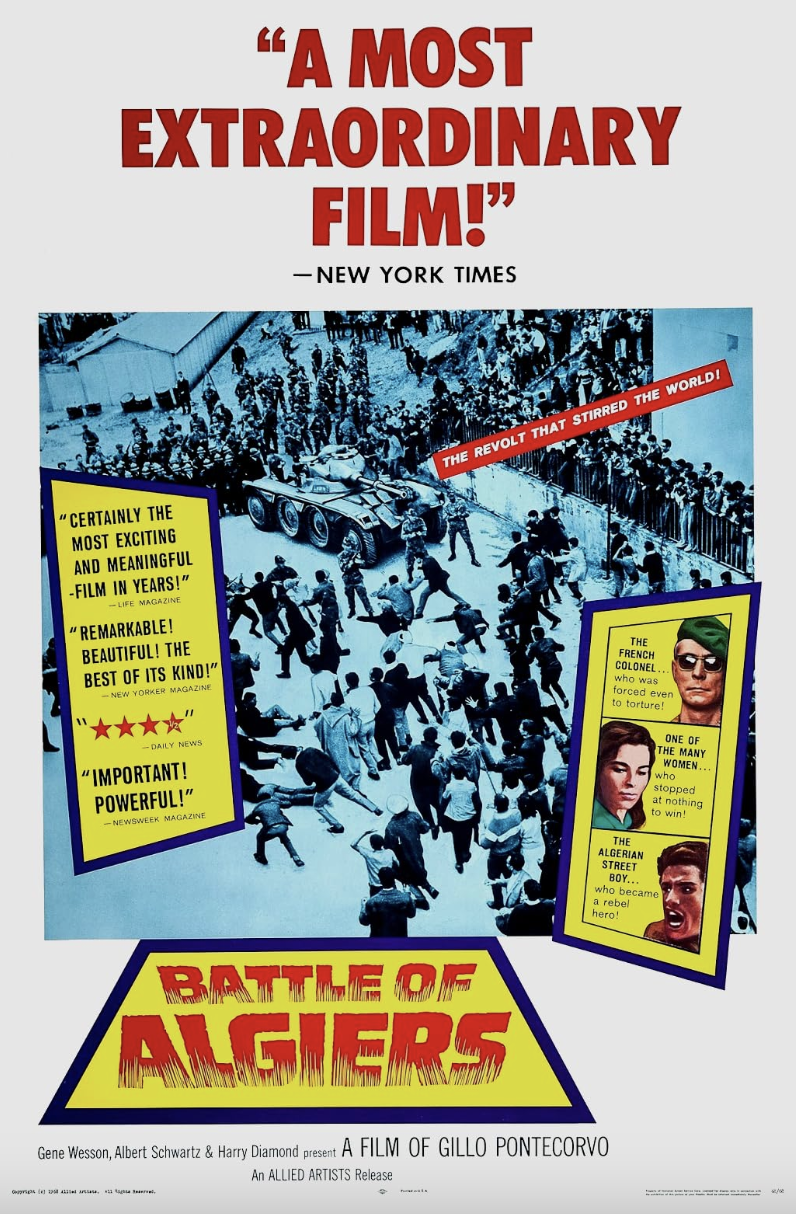
One of the most influential political films in history, The Battle of Algiers vividly re-creates a key year in the tumultuous Algerian struggle for independence from the occupying French in the 1950s. Shot on the streets of Algiers in documentary style, the film is a case study in modern warfare, with its terrorist attacks and the brutal techniques used to combat them. Pontecorvo’s tour de force has astonishing relevance today.
THE BATTLE OF ALGIERS (dir. Gillo Pontecorvo, Algeria/Italy, 1966)
March 15 screening will include a discussion with Daniel Brinkerhoff Young, Visiting Assistant Professor in Philosophy at Union College
The Battle of Algiers is based on action undertaken by rebels during the Algerian War (1954–1962) against the French government in North Africa, the most prominent being the eponymous Battle of Algiers, the capital of Algeria. It was shot on location in a Roberto Rossellini-inspired newsreel style: in black and white with documentary-type editing to add to its sense of historical authenticity, with mostly non-professional actors who had lived through the real battle. The film’s score was composed by Pontecorvo and Ennio Morricone. It is often associated with Italian neorealist cinema.
The film concentrates mainly on revolutionary fighter Ali La Pointe during the years between 1954 and 1957, when guerrilla fighters of the FLN went into Algiers. Their actions were met by French paratroopers attempting to regain territory. The highly dramatic film is about the organization of a guerrilla movement and the illegal methods, such as torture, used by the French to stop it. Algeria succeeded in gaining independence from the French, which Pontecorvo addresses in the film’s epilogue.
The film was met with international acclaim, and it is considered to be one of the greatest films of all time. It won the Golden Lion at the 27th Venice Film Festival among other awards and nominations. It also was nominated for the Academy Award for Best Foreign Language Film. A subject of sociopolitical controversy in France, the film was not screened in the country for five years. Insurgent groups and state authorities have considered it to be an important commentary on urban guerrilla warfare. In Sight and Sound’s 2022 poll of the greatest films of all time, it ranked 45th on the critics’ list and 22nd with directors.
In 2008, the film was included on the Italian Ministry of Cultural Heritage’s 100 Italian films to be saved, a list of 100 films that “have changed the collective memory of the country between 1942 and 1978.
Daniel Brinkerhoff Young is a Visiting Assistant Professor in the Philosophy Department at Union College. His teaching and research focus on the values of self-determination and community in human life. In particular, he works to analyze how certain ways of organizing societies lead to a dehumanization of human life—that is, an atomized, truncated life, stripped of both solidarity with others and the ability to direct the course of one’s own life. In particular, Professor Brinkerhoff Young is interested in how our dependence on capitalist markets and on racial and national hierarchies dehumanizes us. He explores these questions primarily through the history of 19th and 20th century European and Africana anti-colonial traditions, with a focus on figures like Rousseau, Marx, and Fanon. He is currently working on a book on Marx’s concept of social alienation, and some papers on Fanon’s account of colonial racism and alienation.
Part of the Spectres of Empire film series. The Woodstock Byrdcliffe Guild is pleased to collaborate with Union College Film Studies and technical support by the Woodstock Film Festival, in presenting a series of films that speak to colonialism, exploitation and erasure of histories. Each screening will include special guests and a discussion.










Copyright © 2023 Woodstock Byrdcliffe Guild. All rights reserved.